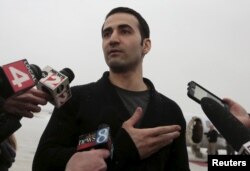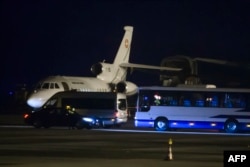The United States airlifted $400 million in foreign currencies to Iran in January to partially settle a decades-old dispute over an aborted arms deal. On the same day, Tehran released four American hostages, but Washington is denying the exchange amounted to a ransom payment.
The U.S. stacked the cash — in euros, Swiss francs and other currencies — on wooden pallets and flew it into Iran on an unmarked cargo plane. It was the first installment on a $1.7 billion settlement stemming from the failed U.S. weapons pact with Iran in 1979 just before its last monarch, Shah Mohammed Reza Pahlavi, was toppled. The U.S. dispatched the cash in foreign currencies because any transaction with Iran in dollars is illegal under U.S. law.
On the same day, Jan. 17, 2016, Iran released four Americans, including The Washington Post's Tehran bureau chief, Jason Rezaian; Marine veteran Amir Hekmati; Christian pastor Saeed Abedin; and a fourth man, Nosratollah Khosravi-Roodsari, whose disappearance had not been publicly known before he was freed.
The cash transfer and the release of the hostages came at the same time as Iran's deal with the United States and five other world powers restraining Tehran's development of nuclear weapons, along with the lifting of sanctions that had hobbled Iran's economy.
President Barack Obama said at the time, "With the nuclear deal done, prisoners released, the time was right to resolve this dispute as well," referring to the 37-year-old arms deal that was never carried out. But Obama did not disclose the $400 million payment, a fact revealed by The Wall Street Journal in a Wednesday story.
Critics denounce payment
U.S. critics of the Iran nuclear deal denounced the payment, with Republican Senator Tom Cotton of Arkansas describing it as "a $1.7 billion ransom to the ayatollahs for U.S. hostages."
Cotton added, "This break with longstanding U.S. policy put a price on the head of Americans, and has led Iran to continue its illegal seizures" of other Americans. Since the January payment, Iran is believed to have seized two more Iranian-Americans, as well as dual nationals from France, Canada and Britain.
Iranian media reports have quoted senior defense officials as saying they considered the cash as a ransom payment.
But White House spokesman Josh Earnest said, "The United States has not paid and will not pay ransom for Americans unjustly detained in Iran."
"The only ones making that argument," Earnest said, "are right wingers in Iran and [U.S.] Republicans who don't like the [nuclear] deal."
Earnest said because Iran had originally paid the money to the U.S. for a deal that ultimately failed, "it was hard for the U.S. to make an argument in this case that we could just keep the money."
U.S. Republican presidential candidate Donald Trump accused his Democratic challenger, Hillary Clinton, of complicity in the payment.












